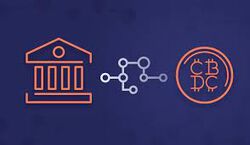Difference between revisions of "CBDC"
(Bo Li quote) |
m (Terje moved page Central bank/Programmable money to CBDC: follow Wikispooks preference for short names) |
(No difference)
| |
Latest revision as of 12:34, 1 February 2024
(Social control, Money, Cryptocurrency) | |
|---|---|
 | |
| Blockchain hosted replacement for cash, run by central banks |
A central bank digital currency or programmable money (CBDC) (also called digital fiat currency[1][2]) is a digital currency issued by a central bank, rather than by a commercial bank, where the one who control the central bank will be able to micro-manage on what the money is used. Plans have been announced which would be implemented using a blockchain hosted on central servers of a central bank.
| Agustín Carstens, general manager of the Bank for International Settlements, explains the advantages of CBDCs |
Contents
Development
Curiously several Western Central Banks are cooperating with the same entities, such as the Bank of International Settlements[3][4], and the Massachusetts Institute of Technology, towards developing their "own" CBDC.[5][6][7]
Possibilities for total social control
The General Manager of the BIS, Agustín Carstens, stated in October 2020 that:
“We intend to establish the equivalence with cash and there is a huge difference there, for example in cash we don’t know who is using a 100 dollar bill today ... the key difference with the CBDC is that the central bank will have absolute control on the rules and regulations that will determine the use regarding that expression of central bank liability and also we will have the technology to enforce that.”
Agustín Carstens (October 2020) [8]
Carstens is general manager of the Bank for International Settlements.
Emphasis added
The emphasis is on social control; a global central authority could - based on automated, computerized decisions - decide who may buy what and when, based on compliance levels of citizens. Moreover automated punishments could be dished out. This would be a monetary revolution comparable to the 1913 Federal Reserve Act.
“[...] you know the digital euro is going to have a limited amount of control. There will be control, you're right, you're completely right. We are considering whether for very small amounts, you know, anything that is around 300, 400 Euros, we could have a mechanism where there is zero control. But that could be dangerous, the terrorist attacks on France, uh back, uh 10 years ago, were entirely financed by those very small anonymous credit cards that you can recharge in total anonymity.”
Christine Lagarde (16 Mar 2023) [9]
Lagarde is President of the European Central Bank
“CBDC can allow government agencies and private sector players to program, to create smart contracts, to allow targeted policy functions, e.g. welfare payments, e.g. consumption coupons, e.g. food stamps. By programming CBDC, those monies can be precisely targeted, for what kind of people can own and for what uses these monies can be utilized, e.g. for food. So this potential programmability can help government agencies to precisely target their support to those people who need support.”
Bo Li, IMF (October 14, 2022) [10]
Bo Li is Deputy Managing Director at the IMF
External links
- Whitney Webb (15 April 22) - Sanctions & the End of a Financial Era with John Titus
Related Quotation
| Page | Quote |
|---|---|
| "Vaccine passport" | “the ambition is huge; both in terms of scale – as it applies to all EU member states – and also in the power it would grant to citizens throughout the Bloc. For the first time, citizens would be able to use a European Digital Identity wallet, from their phone, that would give them access to services in any region across Europe....It gets really exciting when you realise that the wallet can host both digitalised identity and payment credentials. This could allow people, for example, to pay a deposit on a new apartment or settle an outstanding speeding fine directly from their smartphone.” |
References
- ↑ http://www.itu.int/en/ITU-T/focusgroups/dfc/Pages/default.aspx
- ↑ https://www.ecb.europa.eu/press/key/date/2017/html/sp170116.en.html
- ↑ https://www.cnbc.com/2021/05/20/the-fed-this-summer-will-take-another-step-ahead-in-developing-a-digital-currency.html
- ↑ https://www.bankofcanada.ca/2020/06/bank-canada-partners-bank-international-settlements-launch-innovation-centre/
- ↑ https://www.bankofcanada.ca/2022/03/central-bank-digital-currency-collaboration/
- ↑ https://www.bostonfed.org/news-and-events/press-releases/2022/frbb-and-mit-open-cbdc-phase-one.aspx
- ↑ https://www.bankofengland.co.uk/news/2022/march/boe-and-massachusetts-institute-of-technology-joint-cbdc-collaboration
- ↑ https://www.globalresearch.ca/covid-19-ukraine-bouncing-from-one-crisis-next-importance-staying-focused/5773585
- ↑ https://rumble.com/v2ddlps-prank-with-the-president-of-the-european-central-bank-christine-lagarde.html - in conversation with Russian pranksters Vovan and Lexus
- ↑ https://youtu.be/2I9HR7BTmn0